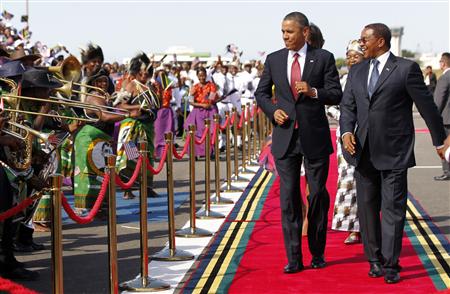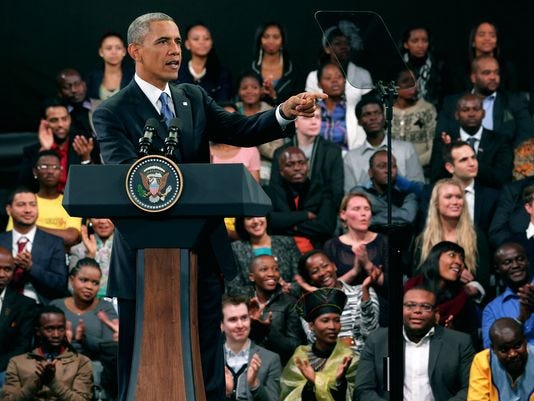
HATIMAYE Rais Barack Obama amezuru Tanzania. Ukweli kwamba Obama ana asili ya Afrika unafanya ziara yake katika baadhi ya nchi za bara hilo iwe na mvuto wa kipekee.
Lakini pengine tukiweka kando furaha ya kutembelewa na Rais wa kwanza wa Marekani ambaye ni Mmarekani Mweusi, na ukweli kwamba ni tukio kubwa kutembelewa na kiongozi wa taifa hilo lenye nguvu kubwa kabisa duniani, ni muhimu kuangalia masuala mengine ya maana zaidi kuhusiana na ziara hiyo.
Pengine kabla sijaingia kiundani katika mjadala huu nisimulie mkasa mmoja ulionikumba huko kwenye mtandao wa kijamii wa Twitter. Jumatatu, mara baada ya Obama kuwasili jijini Dar, nilijikuta nikiingia kwenye ‘vita ya maneno’ na mwandishi wa habari mmoja wa Shirika la Utangazaji la Uingereza (BBC) ambaye ni Mtanzania kama mie.
Kilichosababisha vita hiyo ya maneno ni kuchukizwa kwake na tweets zangu ambazo kwa kiasi kikubwa zilielemea kwenye kuangalia masuala mazito zaidi ya ziara hiyo badala ya mashamushamu yaliyoambatana nayo. Kwa mfano, nilijaribu kuamsha udadisi kuhusu namna Mtanzania wa kawaida atakavyonufaika na ziara hiyo.
Kadhalika nili-retweet tweets mbalimbali za watu mbalimbali waliokuwa wakiiangalia ziara ya Obama kwa mtazamo tofauti; hususan katika masuala ya haki za binadamu, rushwa, nk. Hilo halikumpendeza muungwana huyo, na akanishambulia vikali huku akinituhumu kuwa sina uzalendo na ‘ninatumiwa na wazungu’ (japo naye ni mwajiriwa wa shirika la wazungu).
Vyovyote vile; hatimaye niliamua kumpuuza tu kwani licha ya yeye kuwa mwanahabari (ambaye kimsingi angepaswa kuthamini uhuru wangu wa kujieleza), alionekana kama anakandamiza haki yangu ya kikatiba kutoa mawazo alimradi hayamkashifu au kumtusi mtu.
Kituko hicho ni moja tu ya vilivyoambatana na ziara ya Obama. Juzi, siku kiongozi huyo alipowasili Tanzania, angalau magazeti mawili makubwa ya Marekani - The New York Times na USA Today, yalikuwa na habari nzito kuhusu Tanzania.
Magazeti hayo, kwa kutumia waandishi wake waliokuja huko nyumbani kufanya ‘coverage’ ya ziara ya Obama, yaliandika masuala mbalimbali yanayotia walakini taswira ya nchi yetu.
Kwa kutegemea mahojiano waliyofanya na watu wa kada mbalimbali huko nyumbani, magazeti hayo yalizungumzia tukio la kutekwa Dk. Ulimboka, mauaji ya Padre Evaristus Mushi huko Zanzibar, shambulio la bomu huko Arusha, na kauli ya Waziri Mkuu Mizengo Pinda kuruhusu polisi wawapige wananchi ‘wakorofi.’
Tofauti na magazeti hayo makubwa ndani na nje ya Marekani, mengi ya magazeti yetu ya huko nyumbani (ukiondoa gazetihili maridhawa) yalionekana kuelekeza akili zao zote kwenye lojistiki ya ziara ya Obama, hususan kwenye suala la usalama wake.
Habari zilizotanda kwenye magazeti yetu kuhusu ziara hiyo zilielemea zaidi kwenye idadi ya magari katika msafara wa Obama, ndege zilizokuja (na ukubwa wake), wingi wa mashushushu, na mambo mengine kama hayo.
Ndio, Watanzania walistahili kufahamishwa kuhusu namna Rais wa Marekani anavyolindwa, lakini wangependa zaidi kufahamu ziara hiyo ina manufaa gani kwa nchi yao.
Kadhalika, wananchi hao wangeweza kutendewa fadhila kubwa na magazeti yetu laiti yangeiga mfano wa Ney York Times na USA Today kwa kuitumia ziara ya Obama kuijulisha dunia kuhusu masuala mbalimbali yanayotukwaza kimaendeleo, kwa mfano ufisadi, ukiukwaji wa haki za binadamu, nk.
Lakini tunaweza kwenda mbele zaidi ya kuwalaumu baadhi ya waandishi wetu wa habari wanaohangaika na sensational stories pasi kujali ukosefu wa manufaa yake kwa umma. Tukumbuke ni majuzi tu, nchi yetu ilipata ugeni mwingine mkubwa kimataifa baada ya kutembelewa na Rais Xi Jinping wa China. Taarifa za serikali zilieleza kuwa katika ziara hiyo mikataba kadhaa ilisainiwa kati ya nchi hizo mbili (China na Tanzania). Hadi leo mikataba hiyo imebaki kuwa siri.
Pengine hali itakuwa tofauti katika ziara hii ya Obama kutokana na ukweli kwamba wenzetu wa China bado wanaendekeza sana usiri, suala la haki za wananchi kupewa au kupashana habari halipewi fursa.
Kwa Marekani, labda tutakachofichwa ni mikataba ya siri ya kiusalama, lakini katika hali ya kawaida tunaweza kufahamishwa maafikiano mengi kati ya nchi hiyo na yetu kufuatia ziara ya Obama.
Lakini tatizo kubwa, na ambalo binafsi linanifanya niione ziara ya Obama kama tukio tu la kufurahiwa lakini linaloweza kutokuwa na maana yoyote, ni ukweli kwamba umasikini wetu hautokani na ukosefu wa misaada kutoka kwa mataifa wafadhili.
Kwa mujibu wa takwimu za hivi karibuni, kwa muda mrefu Tanzania imeshikilia nafasi ya tatu duniani-baada ya Afghanistan na Iraki- kwa kupokea misaada ya kimataifa.
Sana sana umuhimu wa misaada hiyo inaonekana zaidi katika matumizi ya anasa ya watawala wetu-magari na samani za thamani kubwa zaidi ya wanazotumia wafadhili wetu – badala ya nchi yetu kujikwamua katika lindi la umasikini.
Japo ni jambo jema kumsikia Obama akionyesha nia ya kushirikiana na nchi yetu na nyinginezo za Afrika katika kuleta maendeleo, ‘ukweli mchungu’ ni kwamba dhamira hiyo nzuri itakwazwa na majambazi wanaosubiri kwa hamu ‘fedha za Obama’ zidondoke ili nao wazihamishie kwenye akaunti zao huko Uswizi au kisiwa cha Jersey, kama sio kuongeza idadi ya magari na mahekalu yao ya kifahari, na pengine hata idadi ya ‘nyumba ndogo’ zao.
Sitaki kuamini kuwa Obama na Wamarekani wenzie hawafahamu hilo; bali wanaona ni tatizo dogo ukilinganisha na faida watakayopata kwa kufunguliwa milango ya kuvuna raslimali zetu; hususan gesi na mafuta.
Si kwamba Obama hakuwa na taarifa kuhusu hali ya ufisadi, ukiukwaji wa haki za binadamu na demokrasia unavyoiathiri nchi yetu na watu wake; bali yayumkinika amezingatia ukweli kwamba “kama wenyewe hawajali kuhusu hatma ya nchi yao na vizazi vijavyo, kwanini mimi nijali?”
Nimalizie makala hii ‘kuwapoza’ wanahabari walioelekeza macho yao kwenye mashamushamu yaliyoambatana na ziara ya Obama badala ya kuangaza kwenye masuala ya msingi zaidi. Huenda wanahabari hao walifanya hivyo kwa kutambua kuwa “Obama atakuja, atatengeneza mazingira kwa Wamarekani kuchuma raslimali zetu, na ataondoka akituacha na umasikini, ufisadi na porojo zetu.”
Wanasema “kwenye ukosefu wa habari ya maana, vioja/mbwembwe au shamrashamra hugeuka habari ya maana.”
Mwisho, asante Rais Obama angalau kwa kututembelea. Hata hivyo, wakati umeondoka huku tukitamani Tanzania yetu iwe taifa la fursa lukuki kama Marekani, sie tunaelekea kubaki ‘taifa lenye fursa lukuki kwa mafisadi.
Na kinachokaribia kulingana na ‘American Dream’ kwa Tanzania yetu ni kiu ya mafisadi kuifilisi nchi yetu kwa ulafi mkubwa na haraka iwezekanavyo.
MUNGU IBARIKI TANZANIA


